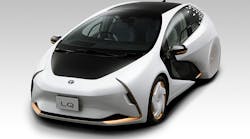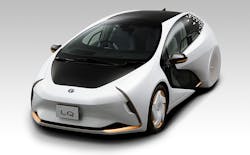Those Big Bets on Solid-State Batteries—The Payoff is Getting Closer
What you'll learn:
- Benefits and manufacturing challenges with solid-state batteries, versus Li-ion batteries.
- Latest advances in solid-state batteries from companies around the world.
- Solid-state battery consortium based in the UK.
Automotive companies expect that electric vehicles (EVs) will become mainstream in the years to come, replacing internal-combustion-engine (ICE) vehicles. For this to happen, an EV must have a similar level of mileage as the current ICE vehicles, which means increasing EV battery capacity.
There are two ways to boost capacity. The first is to increase the number of batteries, but then the battery cost per vehicle goes up and batteries would take up too much space in the vehicle. The alternative is to move to a solid-state battery from the current lithium-ion batteries, where during battery charging and discharging, electrically charged particles (or ions) of lithium pass from one electrode to the other through a liquid electrolyte.
Solid-state batteries offer significant potential advantages over conventional lithium-ion batteries. A solid-state battery promises to be lighter, have more energy density (simply put, the higher the density, the higher the power output), recharge faster, and be more stable in extreme temperatures. Materials proposed for use as solid electrolytes in solid-state batteries include ceramics (e.g., oxides, sulfides, phosphates) and solid polymers.
The research organization Yole Développement expects that solid-state battery commercialization will start around 2025. According to Yole, the solid-state battery market will represent about 2.36 GWh by 2027, followed by accelerated growth.
Around the world, the number of research facilities working on new compounds to serve as both the electrodes and the electrolyte of future solid-state batteries is skyrocketing. Several kinds of all-solid-state batteries are likely to come to market as technological progress continues. The first type will be solid-state batteries with graphite-based anodes, bringing improved energy performance and safety. In time, lighter solid-state battery technologies using a metallic lithium anode should become commercially available.
Beyond research on materials, experiments focus on improving the manufacturing process with a view to scaling up for mass production. Let’s look at recent developments.
The Latest Advances in Solid-State Batteries
Toyota, the world's largest automaker, has partnered with Panasonic and announced that a solid-state battery prototype would debut this year. Toyota also revealed its intention to invest over $13.5 billion by 2030 to develop next-generation batteries, including solid-state batteries.
Toyota aims to slash the cost of its batteries by 30% or more by working on the materials used and the way the cells are structured. The company is developing the solid-state batteries through Prime Planet Energy & Solutions Inc., a joint venture with Panasonic that started operations in April 2020 and has about 5,100 employees, including 2,400 at a Chinese subsidiary.
South Korea's Hyundai is putting $100 million into SolidEnergy Systems (SES), a spin-off company from the Massachusetts Institute of Technology. Founded in 2012, SES is developing anode-free lithium-metal batteries and plans to mass-produce solid-state batteries in 2030.
According to the company, material advances in SES’s batteries make them twice as energy dense while maintaining safety comparable to today’s Li-ion batteries. SES will run a pilot production line to manufacture prototypes that will go inside actual EVs. The prototypes come in 50- and 100-A versions.
Volkswagen has invested in QuantumScape Corp., a Bill Gates and SAIC Motors backed U.S. battery firm that aims to introduce its battery in 2024 for VW's EVs. VW says the battery will offer about 30% more range than a liquid electrolyte battery and charge to 80% capacity in 12 minutes, which is less than half the time of the fastest charging Li-ion cells now available.
QuantumScape claims significant other advantages over Li-ion batteries, including lower manufacturing cost due to the elimination of anode host material. The company estimates that its batteries will have manufacturing costs 17% lower than Li-on; 50-80% range improvement; and longer battery life. The firm’s single-layer cells have shown over 1,000 cycles to a median of over 90% energy retention.
QuantumScape expects to deliver prototype samples by 2022. It also announced a plan to bring the product to volume production in partnership with Volkswagen by 2024.
Lithium-metal anodes, frequently used in all-solid-state batteries, are prone to trigger the growth of dendrites, which can produce undesirable side effects that reduce a battery’s lifespan and safety. Samsung has developed a prototype pouch cell that’s said to be able to power an EV for up to 800 km on a single charge and features a cycle life of over 1,000 charges.
Samsung’s researchers proposed utilizing a silver-carbon (Ag-C) composite layer as the anode. The research team found that incorporating an Ag-C layer into a prototype pouch cell enabled the battery to support a larger capacity and longer cycle life, as well as enhance overall safety. Measuring just 5 µm thick, the Ag-C nanocomposite layer allowed the team to reduce anode thickness and increase energy density up to 900 Wh/L. It also enabled them to make their prototype approximately 50% smaller by volume than a conventional Li-ion battery.
Earlier this year, the Samsung Advanced Institute of Technology showed the research results of a solid-state battery that can be charged/discharged over 1,000 times with 800 km of mileage on a single charge. Samsung expects to have prototype all-solid-state battery cells ready by 2025 and start mass production in 2027.
BMW and Ford are investing $130 million in Solid Power, a Colorado-based solid-state battery startup. BMW is said to be getting solid-state battery test cells in early 2022 from Solid Power, which says its solid-state technology can deliver 50% more energy density than current lithium-ion batteries.
Solid Power is expanding its facilities and the capacity to produce solid-state batteries for use in EVs. The company is moving into a 75,000-square-foot building, giving it the ability to greatly increase the production of the sulfide-based electrolyte material needed for its batteries.
The new building will allow Solid Power to produce about 2,500 kg (about 5,500 lb.), of the electrolyte per month, up from the current 100 kg per month. The company is producing 20-Ah cells and soon will start producing 100-Ah cells, which will be used in EV batteries.
Not all of the manufacturing processes for solid-state batteries have been fully ironed out yet. California-based Sakuu sees 3D printing as a means of making the thin (under 50 µm) ceramic layers. The company believes the only way to do that is with 3D printing as opposed to the typical roll-to-roll method because the ceramic is brittle and prone to cracking when the electrolyte expands and contracts during use. Sakuu estimates one battery cell will take 30 seconds or less to print, and that the 8,000 cells in a 75-kW battery pack would take six hours, maximum.
Solid-State Battery Consortium
A consortium of seven UK-based organizations is developing prototype solid-state battery technology, targeting automotive applications and using scalable manufacturing techniques. The Faraday Institution—the UK’s independent institute for electrochemical energy storage research—will lead its development.
The consortium also includes the following organizations in battery research, development, and manufacturing:
- Britishvolt—the UK-based Gigaplant developer.
- E+R (Emerson & Renwick)—a leading designer of manufacturing equipment.
- Johnson Matthey—the UK’s leading battery materials provider.
- Oxford University—leads the Faraday Institution’s solid-state battery project (SOLBAT). The SOLBAT project started in March 2018 and recently was extended until April 2023.
- UK Battery Industrialization Center—a battery-manufacturing development facility to enable UK battery manufacturing scale-up.
- The University of Warwick—battery R&D.
Solid-state batteries have the possibility of substantially increasing energy density and improving other battery parameters. It’s almost a given that the solid-state battery is essential to making EVs that go farther and run safely.
Designing a solid electrolyte that’s stable, chemically inert, and still a good conductor of ions between the electrodes isn’t easy. But with the number of automakers, academic institutions, and startups investing time and money in the technology, it’s more a question of when and not if their efforts will prove successful.

